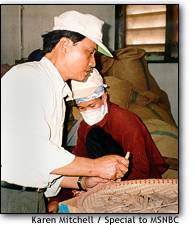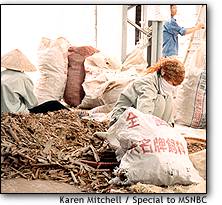
 |
|||
 |
  A cup of java in the heart of Hanoi A cup of java in the heart of Hanoi Becoming a ëRussia guyí Becoming a ëRussia guyí From rags to riches in Russia From rags to riches in Russia |
|||
|
THE YOUNGER Barnett directs and represents Vietnam operations for Pacific Basin Partnership, Inc., a New Jersey corporation established in 1993. PBP is a joint-venture with the state-owned Generalexim Hanoi, Vietnam’s export company. From its processing plant in the countryside district of Gia Lam, near Hanoi, PBP exports over 1,000 tons a year of Vietnamese spices, 85-percent of it cassia (cinnamon). Built on a former clay pit next to a rice paddy, the plant, complete with a fish pond, employs some 60 workers, many of them local farmers. After packing, the spices are shipped by container to Haiphong where they are sent to wholesalers in North America, India and northern Europe. “We are the premier supplier of Vietnamese cassia to all world markets,” says Barnett. “I was the first to import spices from Vietnam to the U.S. since the lifting of the embargo in ’94.” Thus far, Barnett says, the company generates a few hundred thousand dollars a year in revenues, though he refuses to specify exactly how much. |
|||||||||||||||||
|
‘We are the premier supplier of Vietnamese cassia to all world markets,’
— MARK BARNETT |
Armed at all times with the cell phone that’s a neccessity in a country with few office phones, Barnett, who is fluent in Vietnamese can often be found conducting business al fresco, in the shaded cafés near his home in the Hoan Kiem Lake district of Hanoi where he lives with his wife, Yen, and their 18-month son, Hoang. “I was president of the family company, Barnett Spices, Inc. from 1988 until I closed it in 1995,” he says. “We tried to compete with the giants, McCormick and Spice Islands.” Barnett was working in China to export dehydrated garlic and chilies when travel to Vietnam was legalized in 1993. An acquaintance in New York suggested he visit Hanoi and contact Do Dinh Thi, then a department manager at Generalexim, and currently director of PBP’s cassia processing enterprise. |
|||||||||||||||||
| PBP's processing plant manager, Hoang Thanh Son, examines the cassia prior to final preparation for export. . |  “The day I arrived I knew I had come to the right place at the right time. It was quiet in Hanoi,” Barnett says. “The social temperature was right. There were no services, no air conditioned offices, no phone service, often no electricity, but all the delays and inconveniences of doing business and just living here were delightful for me.”
“The day I arrived I knew I had come to the right place at the right time. It was quiet in Hanoi,” Barnett says. “The social temperature was right. There were no services, no air conditioned offices, no phone service, often no electricity, but all the delays and inconveniences of doing business and just living here were delightful for me.” Barnett worked with Generalexim exporting pepper and cassia, and after six months, he says, his U.S. business partners decided to set up an investment in Vietnam. “We started with a small investment to establish trust,” he says. “That’s how we began, with letters of credit and persistence. All the current investments are from internally generated capital.” CULTIVATING THE CASSIA MARKET Vietnamese cassia comes from the bark and small branches of trees that are between 10 to 20 years old, although PBP’s higher grade cassia, which has a higher oil content, is from trees that are 20 to 25 years old. The high seasons for harvesting are spring and fall. Trees which are cut down in the harvesting process are quickly replaced. |
|||||||||||||||||
| Sacks of cassia being readied for the cleaning and sorting process. |  At the plant, the cassia is sampled for oil content and moisture. After being cleaned, sorted and sifted, a complex process involving machinery built entirely in Vietnamese factories according to international standard designs, the cassia is inspected, blended for flavor and oil, cut and bagged.
At the plant, the cassia is sampled for oil content and moisture. After being cleaned, sorted and sifted, a complex process involving machinery built entirely in Vietnamese factories according to international standard designs, the cassia is inspected, blended for flavor and oil, cut and bagged.Sold mainly to wholesalers, the cassia is often mixed and blended with that purchased from other markets such as Indonesia. | |||||||||||||||||
|
“Although cassia can vary from lot to lot, and vary within one lot, the Vietnamese cassia is of a high quality and is incomparable to any other on the market,” says Kay Wright, director of botanical purchasing at herbal tea giant Celestial Seasonings, Inc. Generalexim/PBP cassia is used in several Celestial Seasonings teas such as Bengal Spice, Almond Sunset and Mandarin Orange. “Mark Barnett has invested considerable time and energy into making this effort a success, one of the more successful business cooperative agreements in Vietnam,” says Ross G. Kreamer, who is the agricultural counselor, at the U.S. Embassy in Hanoi. “Not all investors are prepared to take the leap Mark has in Vietnam.”  A cup of java in the heart of Hanoi A cup of java in the heart of HanoiKreamer says that Barnett “has begun to reap positive returns on his considerable sweat-equity.” |
|||||||||||||||||
|
For his part, Barnett credits his success to care and patience and good partners in Hanoi. “I think every kid in America should go to school once a week with a cinnamon bun made with Vietnamese cinnamon,” he says. “I’m doing something Vietnam needs by exporting the cinnamon of 10,000 Vietnamese families,” he adds. “I’m a happy man. I love being here. We occupy a niche that is appreciated, and no doubt there are other niches yet to be filled.” The small ironies of the spice trade are not lost in trans-Pacific geography. “Legend has it that in 1948 a New York spice importer advanced Norman (Barnett’s grandfather) $150,” Barnett says. That very same importer — “Now he’s one of my customers.” |
|||||||||||||||||

|
||||||||||
|
|||||||||||||||||
|
|||||||||||||||||
| Cover | Quick News | News | Business | Sports | Local | Technology
| Living & Travel | Health TV News | Opinions | Weather | Shop@MSNBC | MSN | Comics | Find | About MSNBC | Help | Index Cool Tools | Jobs | Write Us | Advertising on MSNBC | Y2K Statement | Terms, Conditions, and Privacy |
|||||||||||||||||